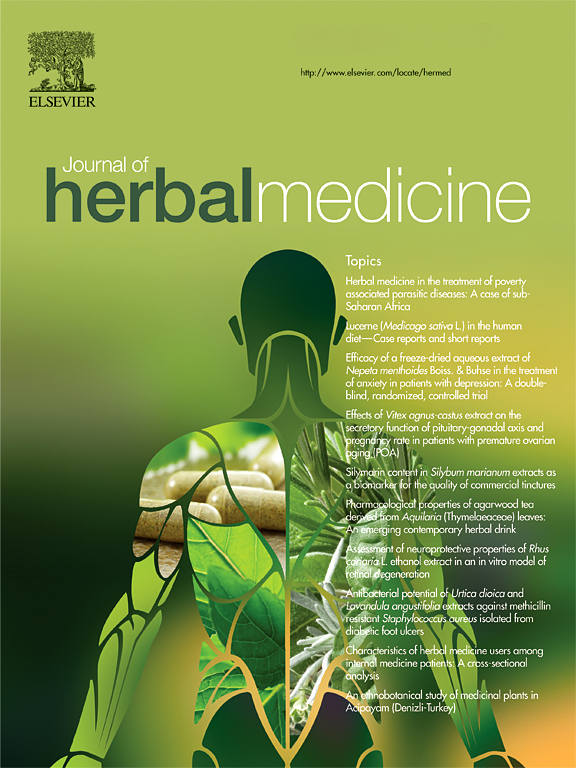大蒜提取物(Allium sativum)与氯己定漱口水的临床抗菌效果比较:系统综述
IF 1.9
4区 医学
Q2 INTEGRATIVE & COMPLEMENTARY MEDICINE
引用次数: 0
摘要
氯己定被广泛用作黄金标准漱口水,但存在副作用和对抗菌素耐药性的担忧。大蒜(Allium sativum)以其天然抗菌特性而闻名,已成为潜在的替代品,尽管临床证据仍然有限。本系统综述比较了大蒜提取物与氯己定在临床实践中的抗菌效果,评估了其作为草药替代品的可行性。方法根据2020年系统评价和荟萃分析的首选报告项目指南进行研究,并利用PICO框架建立研究问题。2024年1月共从6个电子数据库中检索到389篇论文,通过人工引文检索检索到13篇论文。在删除重复并应用纳入和排除标准后,只有5篇文章被纳入。结果包括随机对照试验和临床研究在内的研究显示出不同的特征和低至中等偏倚风险。大蒜提取物漱口水显示出与氯己定相当的功效,特别是在较高浓度下。效果根据漱口水浓度和使用时间的不同而不同,这导致了结果的差异。一些研究支持氯己定维持较高的菌斑/唾液pH值,而另一些研究报告大蒜提取物在一定浓度下更有效。然而,大蒜漱口水可能会引起更大的不适。结论大蒜提取物可作为氯己定的有效替代品,特别是在较高浓度时。然而,副作用如烧灼感和不愉快的味道可能会影响患者的依从性。进一步的临床研究需要更大的样本和更长的随访时间来证实有效性和提高临床适用性。本文章由计算机程序翻译,如有差异,请以英文原文为准。
The Clinical Antimicrobial Efficacy of Garlic Extract (Allium sativum) Compared to Chlorhexidine Mouthwash: A Systematic Review
Introduction
Chlorhexidine is widely used as a gold standard mouthwash but is associated with side effects and concerns over antimicrobial resistance. Garlic (Allium sativum), known for natural antimicrobial properties, has emerged as a potential alternative, though clinical evidence remains limited. This systematic review compares the antimicrobial efficacy of garlic extract with chlorhexidine in clinical practice, assessing its viability as a herbal substitute.
Methods
The study was conducted according to the Preferred Reporting Items for Systematic Reviews and Meta-analyses 2020 guidelines and utilized the PICO framework to establish the research question. A total of 389 articles were identified from six electronic databases in January 2024, and an additional 13 articles were included through manual citation searching. After removing duplicates and applying inclusion and exclusion criteria, only five articles were included.
Results
Studies, including randomized controlled trials and clinical studies, showed variable characteristics and low-to-moderate risks of bias. Garlic extract mouthwash showed comparable efficacy to chlorhexidine, particularly at higher concentrations. The effectiveness varied based on mouthwash concentration and duration of application, contributing to differences in outcomes. Some studies favored chlorhexidine for maintaining higher plaque/salivary pH, while others reported garlic extract to be more effective at certain concentrations. However, garlic mouthwash may cause greater discomfort.
Conclusions
Garlic extract can serve as a viable alternative to chlorhexidine, especially at higher concentrations. However, side effects such as burning sensation and unpleasant taste may affect patient adherence. Further clinical studies with larger samples and longer follow-up are needed to confirm effectiveness and improve clinical applicability.
求助全文
通过发布文献求助,成功后即可免费获取论文全文。
去求助
来源期刊

Journal of Herbal Medicine
INTEGRATIVE & COMPLEMENTARY MEDICINE-
CiteScore
3.90
自引率
0.00%
发文量
94
期刊介绍:
The Journal of Herbal Medicine, the official journal of the National Institute of Medical Herbalists, is a peer reviewed journal which aims to serve its readers as an authoritative resource on the profession and practice of herbal medicine. The content areas of the journal reflect the interests of Medical Herbalists and other health professionals interested in the clinical and professional application of botanical medicines. The objective is to strengthen the research and educational base of herbal medicine with research papers in the form of case studies, original research articles and reviews, monographs, clinical trials and relevant in vitro studies. It also publishes policy statements, opinion pieces, book reviews, conference proceedings and profession related information such as pharmacovigilance reports providing an information source for not only the Herbal Practitioner but any Health professional with an interest in phytotherapy.
 求助内容:
求助内容: 应助结果提醒方式:
应助结果提醒方式:


